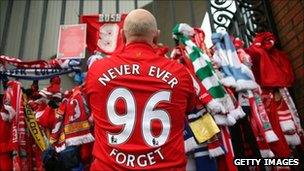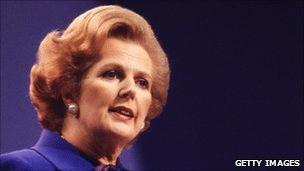Will Hillsborough disaster files be made public?
- Published

Ninety-six Liverpool fans were killed in the disaster
For the first time since the Hillsborough stadium disaster 22 years ago, MPs will debate whether or not to release all documents relating to the tragedy.
On 15 April 1989, 95 Liverpool supporters were killed in a crush of fans at Sheffield Wednesday's ground, where the club was playing an FA Cup semi-final against Nottingham Forest.
The 96th victim was in a coma for three years and died in 1992.
If the House of Commons votes in favour, Cabinet documents would reveal discussions held by then Prime Minister Margaret Thatcher in the days that followed.
How did the debate come about?
The debate was triggered when more than 139,000 people signed a government e-petition, external calling for the full, uncensored release of 40,000 documents relating to the disaster and its aftermath.
Signatures increased significantly after it was tweeted by Liverpool manager Kenny Dalglish, who said "it is very important that we support this".
Steve Rotheram, Labour MP for Liverpool Walton, will put forward the motion on Monday and, unless home secretary Theresa May agrees to the motion, there will then be a Commons vote.
Mr Rotheram said a vote in favour would be "a major a step towards finally achieving justice for the 96".
Why have the papers not been released before?
Cabinet papers are not published in the UK until 30 years after they have been written. This is to help protect the convention of collective responsibility where the Cabinet must be seen to be in agreement about all decisions in order that new policies are not undermined.
Papers, when they are released, can show that individual Cabinet members argued against certain policies and decisions at the time, and can reveal their attitudes to events.
The Freedom of Information Act, which had its first reading in 1998, was introduced to enable groups to request that Cabinet papers are released early. These requests can be turned down by governments, often on grounds that the information could threaten national security.
In 2009, the then Labour government set up the Hillsborough Independent Panel to "oversee the maximum possible public disclosure of governmental and other agency documentation relating to the Hillsborough tragedy and its aftermath".
However, the Cabinet Office has maintained no material should be disclosed before the panel finishes its work, planned for next year.
In response to a BBC Freedom of Information request in April 2009, Information Commissioner Christopher Graham ruled a full release of the papers was in the public interest.
The government then appealed insisting the documents should be released to the panel first.
If its appeal is successful, the papers will not be released until spring 2012.
Why do some people want the papers released now?
Relatives of the 96 victims and their supporters maintain they want to know exactly how the Cabinet and Prime Minister Margaret Thatcher responded to the disaster in the days and months that followed.
The independent inquiry led by Lord Chief Justice Taylor in 1989 established that the main cause was a failure of police crowd control.
Mrs Thatcher was briefed about the disaster in the days that followed.

Margaret Thatcher was Prime Minister at the time of the Hillsborough disaster
The records to be disclosed include reports presented to her, correspondence between her office and that of the then home secretary Douglas Hurd, and Cabinet minutes.
Some campaigners for the victims' families have claimed Mrs Thatcher sought to avoid South Yorkshire Police being criticised.
It was later estimated that more than 3,000 supporters were admitted to the central pens - almost double the "safe" capacity.
The Hillsborough Family Support Group has always accused the police of conducting a cover-up, while the force has argued it was entitled to edit the statements, removing comment and hearsay.
Chair of the Hillsborough Families' Support Group, Margaret Aspinall, who lost her 18-year-old son James in the tragedy, has stated that the independent panel and the families should see the documents before they are released to the general public.
What is the present government's position?
Prime Minister David Cameron has written to shadow health secretary Andy Burnham to say he is "wholly committed" to the public release of all the 1989 government papers on Hillsborough.
A spokesman said: "The Government has confirmed its commitment to full transparency about the Hillsborough disaster through full public disclosure. All papers had previously been shared with the Hillsborough Independent Panel.
"The Government is happy for all the papers, including Cabinet papers, to be released as soon as the Panel so decides, in consultation with the families.
"We expect them to be shared with the Hillsborough families first and then to the wider public."
But petitioners are demanding that the information given out is not pre-filtered before being given to the families.
That view was recently endorsed by Deputy Prime Minister Nick Clegg who told the Commons "it is very important we get to see all the relevant papers over the tragedy in which 96 Liverpool football supporters died".
The debate is due to begin at 17:30 BST and will be shown live on the BBC News website.
- Published25 August 2011
- Published23 August 2011
- Published17 August 2011